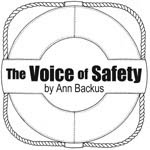The Winter Fishing Season Is Upon Us
by Ann Backus, MS

We have recently set our clocks back here on the East Coast and have seen the fabulous, full super moon (Nov.14), a moon that was larger than life because the perigee of the moon’s orbit was as close to earth as it will be until 2034. In these two events we have the juxtaposition of the routine and the unique.
So it is with winter. Its seasonal arrival is routine, but what winter holds for us may well be unique. In the fishing industry we have to prepare for both.
For fishermen who refit their lobster boats to scallop dredges for winter fishing, the process may be routine. Just assemble the frame, set-up the cables and attach the dredge. Been there, done that. However, those of us interested in safety would suggest that you consider whether or not your structure allows you to “tow low.” A high A-frame structure raises the boat’s center of gravity, rendering it less stable and therefore less able to respond to or recover from unique situations such as rogue waves a-beam or a hung-down dredge.
In the winter of 2014, from January 1 through March 20, of 42 casualties, 10 were in the lobster fishery, 7 were scalloping and 16 were either sunk (5) or disabled (11). For the same period in 2015, there were 44 casualties, of which 12 were lobstering, 7 scalloping and 19 either sunk (9) or disabled (10). Similarly in 2016, of 44 casualties, 6 were lobstering and 10 scalloping, and 24 were either sunk (9) or disabled (15).
These data remind us that even though we expect winter as a routine occurrence, we need to prepare for the uniqueness it deals up, namely a cold, harsh environment that tests our readiness and resolve.
Icing
Although a major cause in only a few of the casualties from 2014-2016, icing destabilizes a boat because it adds weight above the center of gravity, making the boat top-heavy, in the same way a high-towing A-frame creates a top-heavy situation. How do you prepare for icing? First, by not starting out with a top-heavy rig, and secondly by closely checking the weather forecast and possibly using the Dial-A-Buoy program (888-701-8992) to get a reading of air temperature, water temperature and wind speed at a buoy near you. (After dialing, enter 1 and the five-digit or character code of the buoys near you. See http://www.ndbc.noaa.gov/maps/Northeast.shtml.)
Excessive water on deck
A rogue wave or build-up of rainwater on deck can also destabilize a boat. Prepare for this situation by being sure the freeing ports are open, and if you have deck hatches, they need to be secured shut.
Hypothermia
For yourself, warm, waterproof clothes, hats, gloves and socks are essential. Add a spare set and perhaps a balaklava for your face. Check yourself and crew members for frostbite. Oh yes, the immersion suit: Be sure it fits this season and check it for weak spots and tears. Presumably you have stored it away from petroleum products; they will degrade the neoprene material. Coat the zipper using the synthetic wax stick that came with the suit. Check the batteries in the strobe light.
Home scene
From our recent survey research in Gloucester and New Bedford, we heard from fishermen and their families that it is important that at least one family member know where the important legal and financial documents are kept and have access to key usernames and passwords for bank and credit card accounts, etc. One afternoon of organizing the important household and personal documents in well-marked files could make life easier for surviving family members should there be a casualty at sea.
The boat
Routine maintenance goes a long to ensuring safe return. Some of the disabled casualties mentioned above were due to engine failures and fires. Oil levels, fuel lines, exhaust structures should all be checked. And, of course, the required EPIRBs, life rafts, immersion suits and radio should be ready for service.
Training, drills
In the event of a unique, unforeseen situation, training and drills prepare captain and crew to have the quick and appropriate responses that help ensure rescue and survival. If the winter fishing season is your slow season, you can probably spare a day to refresh fishing safety and coldwater survival training.
To meet the winter season head-on, routine maintenance and preparation are essential, but thought should also be given to readiness for unique situations brought on by weather, illness, lack of vessel integrity, or equipment malfunction.
Have a productive, safe winter season.
Ann Backus, MS is an Instructor in Occupational Health at Harvard School of Public Health, 665 Huntington Ave., Boston MA 02115, 617-432-3327, abackus@hohp.harvard.edu.
